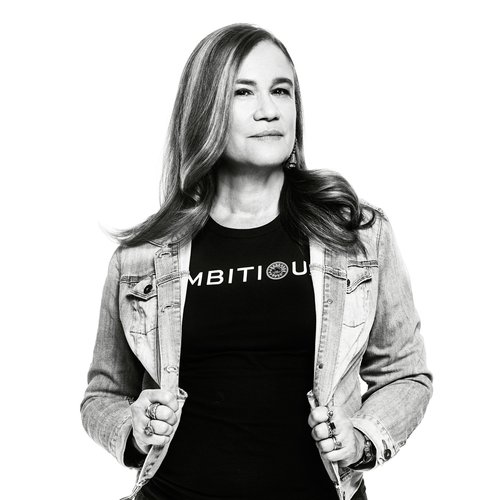The President of the Tory Burch Foundation's #1 Piece of Advice for Aspiring Female Entrepreneurs
starting at just 16 years old, laurie fabiano was motivated to help others, which has led to her long and incredibly impactful career of working in the nonprofit world. fabiano became an aids activist in the late 80s, which was motivated by the loss of a family member. throughout her seven year commitment to aids, she put on several events and raised millions of dollars for the cause. fabiano continued her nonprofit work as the robin hood foundation’s senior vice president and helped grow the foundation into the largest private organization fighting poverty in new york city. today, laurie fabiano serves as president of the tory burch foundation, which is solely focused on supporting the empowerment of women entrepreneurs. laurie is committed to making the world a better place, particularly for women, and talks about her passions, her work and her hardships on her incredible journey.
the void: you have a long history of philanthropic work and activism from the robin hood foundation, your work with aids and now as head of the tory burch foundation. what is it about these projects that are so important to you?
laurie fabiano: i’ve always lead with passion, so whatever i am passionate about is what i go for. for example, when i got into the aids epidemic, it was in its height -- my sister-in-law had just died of aids and i felt helpless and wanted to do something. some of those drugs were coming on board that were finally saving people's lives but one of the things that i faced it was worse for poor people no matter what the crisis is and i felt really strongly about poverty. so that’s why i went to the robin hood foundation and was there for 11 years. leaving there i felt it was time, i did everything i could do for the organization. when i came on board there was ten of us and when i left there was 90 something. so we managed to really build the organization and it’s great and continuing to do great.
then i had my own company and worked as an entrepreneur, which was something i always wanted to do for about six years. i had no intention of leaving that but then tory called about three years ago and she was very persuasive. i realized what i wanted to do in the latter part of my life was get back to my initial passion which was women, and had been since i was 16. it was kind of like everything had gone full circle.
the void: we couldn’t agree more. why do you think you felt so strongly that you wanted to help women?
laurie: since i was 16 years old, i considered myself a feminist even in those years when people weren’t willing to do it anymore. i always felt very strongly about women’s issues, and there are so many issues, whether it’s violence against women or job fields women aren’t able to break into. but the thing about entrepreneurs that really resonated was, yes, women are becoming entrepreneurs and are entering and starting business at the same rate and even a greater rates than men, but they fall off and their business fail to grow. so to me, there seems like a great challenge there of how we get those women businesses to sustain and grow at the same rate as men. entrepreneurs lead tons and tons of business where both men and women fail, but women businesses really stall before the million dollar mark so we really hone in on how to get those women’s business past the million dollar mark.
the void: in your estimation, why do they stall general speaking? and what is it that the tory burch foundation is doing specifically that is helping them push through those moments?
laurie: well, there are lots of reasons but the first is a systemic reason that women have far less access to capital than men do. only 1 in 23 dollars in business loans goes to a woman entrepreneur, yet they’re starting business at the same rate as men. a lot of women who are entrepreneurs are pivoting from another job because perhaps their career path was interrupted by motherhood or something else so they oftentimes don’t have the business education.
for those two things we partnered with bank of america to give loans to women who can’t get them from traditional banks and we’ve done about 30 million dollars in loans to women entrepreneurs for that program. on the education side, we’ve partnered with goldman sachs to provide women with a really top notch program, almost like a mini mba -- all the business basics they will need to build their company. women are juggling so much that they don’t have access to the kind of networks and mentors that men tend to do nor the flexibility, which is why we’ve put so much effort into the website because we wanted something that was available to women 24/7.
what’s been really eye opening is there are a lot of cultural impediments. the one that jumped out at me the most is this whole double standard around ambition. it’s okay for a guy to be ambitious but in most cases it’s considered unattractive, unappealing, suspect when a woman is ambitious. we ran a big campaign last march encouraging women to embrace ambition and that is really one of the mantras of the foundation.
the void: we’ve had a number of gatherings and the topic of “women having it all” tends to come up a lot in conversation. should women try to have it all? it seems like an unfair bar to try and reach for a lot of people. what is your view on that? i
laurie: i’ve always hated the “can women have it all” thing. to be honest, i feel it should be, women should have what they want. if what they want is to be a parent and start and run a business, that is great. if they want to just be a parent, that is great too. they should have what they want. it also puts tons of pressure on somebody. why should a stay at home mom feel less than because she’s not balancing more? you don’t want to, i think that by saying you want it all, you’re kind of passing judgement on people. it should be just what the hell women want.
the void: from your personal standpoint, what has been your biggest challenge personally or professionally you overcame? you’ve obviously accomplished so much and had many iterations of your career and have affected a lot of people. what has been difficult for you that may be surprising?
laurie: well i think because my work has been primarily in non-profit the biggest hurdle i had to get over was asking for what i deserved financially and it took me a very long time and there were many years where i clearly wasn’t making the amount of money that i should have been making.
the void: if you had to give a piece of advice of someone starting on their own journey or hitting their own roadblock on starting their business or putting it to paper, what would your advice be?
laurie: i think my advice would be that the best career paths are not linear. lots of times young women who work with me or have worked with me have been like “i need this title”and “i’m just going to move up the ladder in this way.” those tend to be the people that are least interesting to me. i want the someone that veered off the path and learned a hell of a lot about something else. i want someone that has faced a roadblock. roadblocks are good and you’re never going to live a life without roadblock so getting in and around them is a really good skill.
the void: any final thoughts?
laurie: i think the main thing is (and i think more women are doing it now) you have to support each other and have each other’s backs. if you’re in a meeting and another woman isn’t being heard -- chime in and help her be heard. don’t let your women colleagues sit around the outer ring in a big meeting, pull into the table and empower each other!
make sure to check out all of laurie’s work at the tory burch foundation here!

